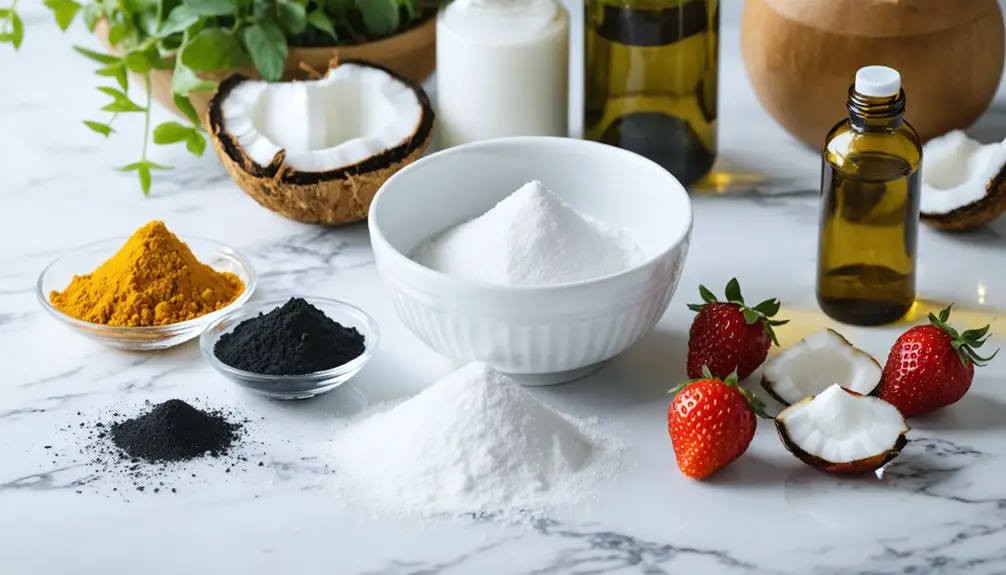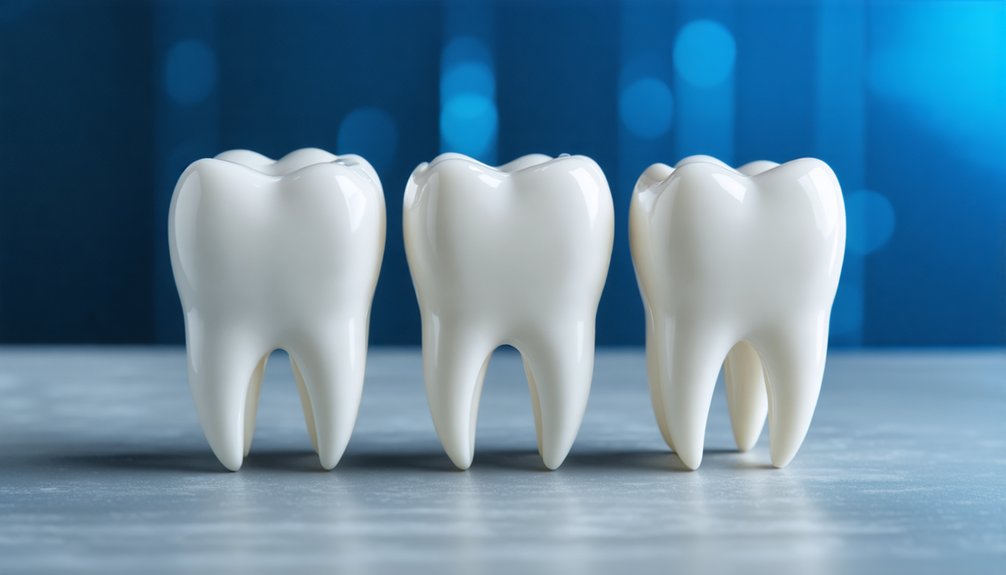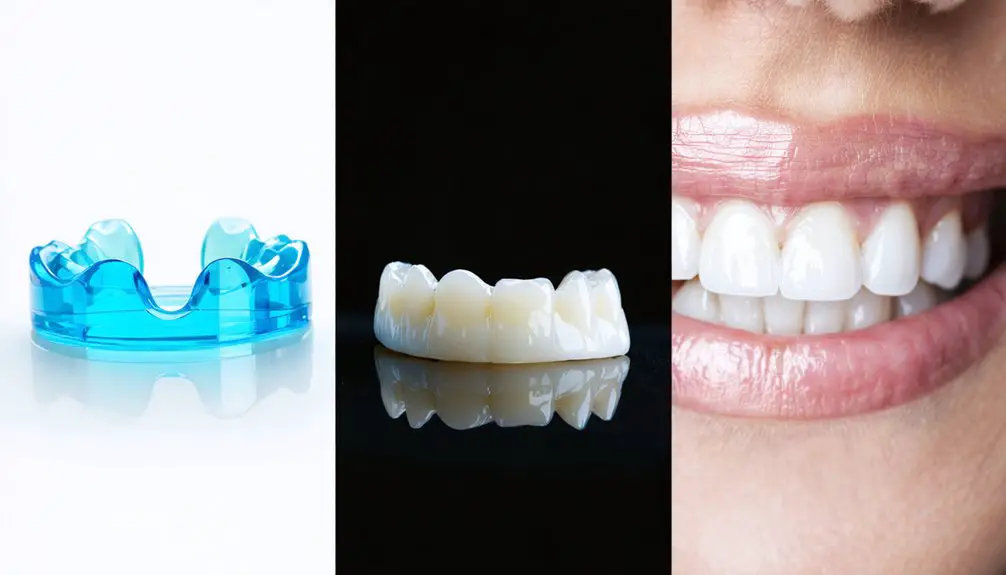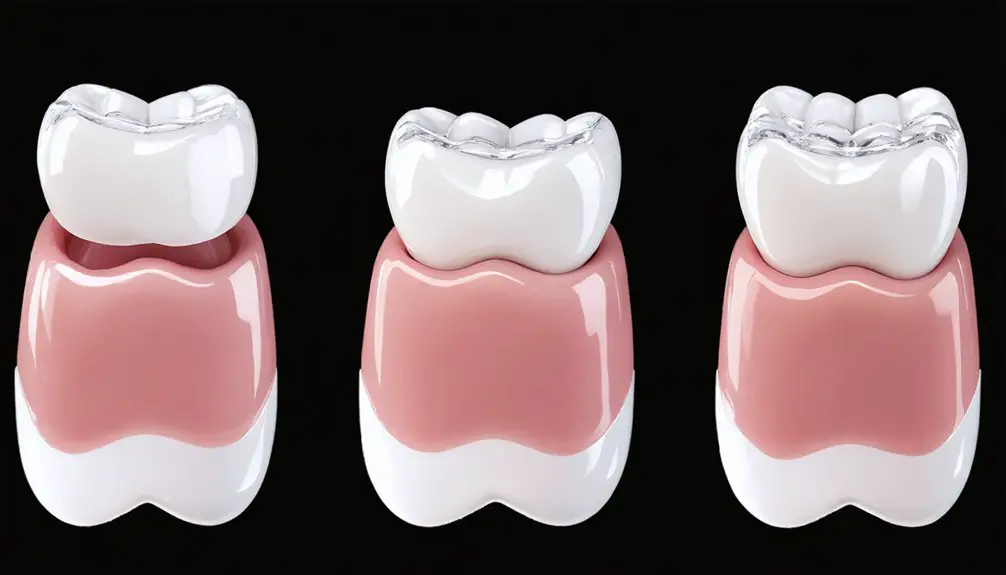While genetic tooth discoloration can’t be completely reversed at home, you can minimize its appearance through targeted remedies. Start with gentle brushing using a soft-bristled toothbrush and fluoride toothpaste. Incorporate oil pulling with coconut oil, use baking soda mixtures for surface stains, and adjust your diet to avoid staining foods. Add crunchy fruits and vegetables to naturally clean teeth, use straws for beverages, and maintain consistent professional cleanings. These proven strategies will help you develop an effective management plan.
Key Takeaways
- Use a mixture of baking soda and hydrogen peroxide as a gentle natural whitening paste to help lift surface stains.
- Practice oil pulling with coconut oil for 15-20 minutes daily to reduce bacteria and gradually minimize discoloration.
- Consume crunchy fruits and vegetables to naturally clean teeth and stimulate protective saliva production.
- Pair staining foods with dairy products to create a protective coating that prevents further discoloration.
- Implement a consistent brushing routine with fluoride toothpaste and soft bristles to maintain optimal oral health.
Understanding Your Genetic Tooth Condition
While many tooth discoloration cases stem from external factors, certain genetic conditions can cause inherent tooth discoloration from birth.
Two primary genetic conditions – dentinogenesis imperfecta (DGI) and amelogenesis imperfecta – affect tooth structure and appearance through distinct genetic inheritance patterns.
If you have DGI, mutations in your DSPP gene cause grayish-blue or yellow-brown discoloration with weakened dentin. DGI affects approximately 1 in 6,000 people.
Amelogenesis imperfecta involves enamel development issues, resulting in yellow-brown teeth with fragile, pitted surfaces.
Intrinsic staining from these conditions proves more resistant to treatment compared to external stains.
Both conditions affect your baby and permanent teeth, increasing decay risk and structural vulnerabilities.
Understanding your specific genetic condition is essential for proper management.
Your dentist can identify these disorders through physical examination, family history analysis, and genetic testing, helping determine the most effective treatment approach for your situation.
Essential Dietary Changes for Better Tooth Health
Making strategic dietary changes can greatly improve your tooth health and reduce discoloration risks. Your dietary strategies should focus on enamel protection while avoiding foods and drinks that cause staining. Maintaining proper oral hygiene through professional dental cleanings every six months is essential for removing deep stains. Consuming too many sugary snacks and drinks can promote bacteria growth that leads to yellowing teeth.
Smart food choices and mindful eating habits protect tooth enamel and prevent stains, keeping your smile naturally bright and healthy.
By combining protective eating habits with smart food choices, you’ll create a foundation for maintaining whiter teeth.
- Pair staining foods with dairy products like cheese or milk to neutralize acids and create a protective coating on your teeth.
- Use straws when drinking coffee, tea, or wine to minimize direct contact with your teeth.
- Choose crunchy fruits and vegetables that naturally clean teeth while stimulating protective saliva production.
- Space out your consumption of acidic or pigmented foods throughout the day to allow your enamel recovery time.
Natural Whitening Methods That Work
You’ll find several proven natural methods to brighten your smile, including a careful mix of baking soda with hydrogen peroxide or gentle fruit enzymes that can lift surface stains.
While oil pulling and mineral-rich remedies offer supplementary benefits for oral health, the most effective natural whitening comes from combining these treatments with smart dietary choices that prevent new stains. Professional cleanings remain essential for maintaining optimal results.
Your success with home whitening depends on consistent, moderate application of these methods while protecting your enamel from harsh abrasives or excessive acids. A 2012 study confirms that fruit enzymes like papain are particularly effective at removing tooth discoloration when used regularly.
Gentle Stain Removal Methods
When seeking natural ways to whiten teeth, several gentle stain removal methods have shown promising results with minimal risk to enamel. You’ll find that careful application of these techniques can help reduce surface stains while protecting your tooth structure. Eating crunchy fresh produce naturally scrubs teeth while increasing beneficial saliva production.
- Oil pulling with coconut oil for 15-20 minutes daily helps reduce oral bacteria that contribute to yellowing, though scientific evidence shows limited whitening effects. Lauric acid in coconut oil provides natural antimicrobial benefits during the oil pulling process.
- Baking soda mixed with water creates a mild abrasive paste that’s effective for surface stain removal without significant enamel damage.
- Low-concentration hydrogen peroxide (1.5%-3%) combined with baking soda offers enhanced whitening when used briefly in mouth guards.
- While activated charcoal shows immediate results, it’s best used sparingly due to its higher abrasiveness and potential long-term enamel damage.
Diet-Based Whitening Solutions
Natural dietary choices play a powerful role in maintaining whiter teeth, offering both immediate and long-term benefits for your smile. For fruit benefits, incorporate strawberries containing malic acid and pineapple rich in bromelain—both natural whitening agents. Professional dental supervision is recommended since excessive bleaching agents can damage enamel.
Apples and kiwis provide mechanical cleaning while delivering essential nutrients for oral health. Consuming dairy products like cheese helps protect tooth enamel through its beneficial casein content.
Smart vegetable choices can enhance your teeth’s appearance through abrasive action. Raw carrots, celery, and broccoli effectively scrub away surface stains while stimulating saliva production.
Broccoli’s high calcium content helps reinforce enamel, while onions’ sulfur compounds fight plaque formation.
Consider adding nuts and seeds to your diet, as their textured surfaces help exfoliate teeth naturally while providing protective oils and essential minerals that support lasting whiteness.
Safe Bleaching at Home
Safe at-home teeth whitening requires understanding proven methods that balance effectiveness with protecting your dental health. When exploring home remedies for bleaching, focus on scientifically-supported techniques that won’t damage your enamel or irritate your gums.
- Mix baking soda with water to create a gentle whitening paste, or combine it with hydrogen peroxide (2:1 ratio) for enhanced results over a two-week period.
- Try oil pulling with coconut oil for 15-20 minutes daily to reduce stain-causing bacteria and improve overall oral hygiene.
- Use commercial whitening products containing 6.5% hydrogen peroxide or 10-22% carbamide peroxide as directed.
- Avoid acidic DIY mixtures like lemon juice, and use activated charcoal sparingly due to its high abrasiveness.
Daily Oral Care Routine Adjustments
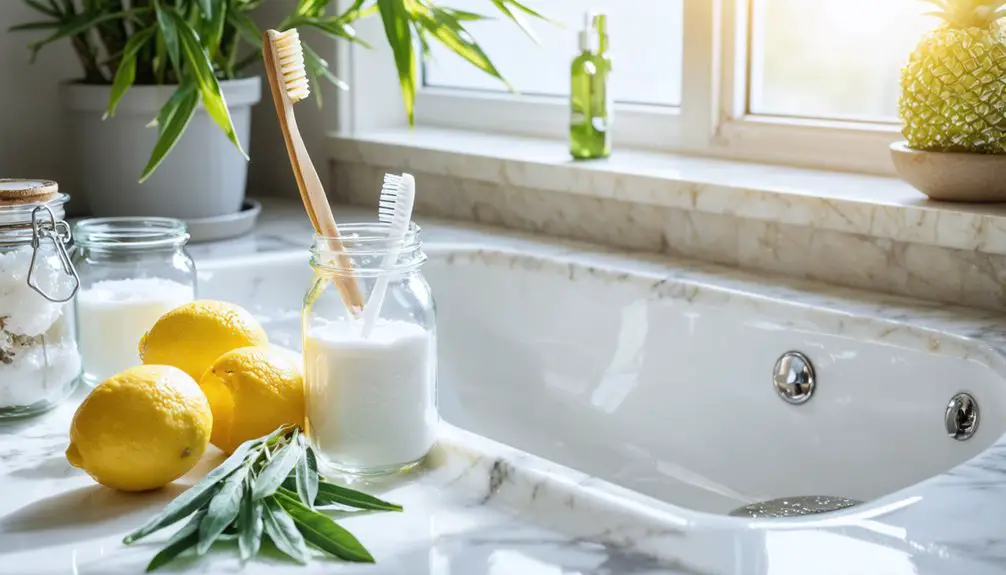
Making targeted adjustments to your daily oral care routine can greatly improve tooth discoloration, particularly for those with genetic predisposition to enamel issues.
Start by adopting gentle brushing techniques with a soft-bristled toothbrush, using circular motions to protect fragile enamel. Remember to replace your toothbrush every three months to maintain ideal cleaning effectiveness.
Incorporate fluoride toothpaste into your twice-daily brushing routine, and consider periodic use of whitening toothpaste for surface stains.
Floss before brushing to maximize fluoride penetration between teeth. For enhanced cleaning, use interdental brushes or water flossers, especially if you have gaps from enamel defects.
After consuming staining foods or drinks, rinse with water or chew sugarless gum to minimize pigment adherence and neutralize acids that can worsen discoloration.
Professional Treatment Options to Consider
If you’re looking beyond home remedies, dental bonding offers a quick solution for isolated discoloration, while porcelain veneers provide extensive coverage for widespread staining that resists conventional treatments.
Both procedures require professional expertise and can simultaneously address other cosmetic concerns like chips or gaps.
While bonding typically needs renewal every 5-7 years, veneers offer a more durable solution lasting up to 15 years with proper care.
Dental Bonding and Veneers
Two professional treatments stand out for addressing tooth discoloration when home remedies aren’t sufficient: dental bonding and porcelain veneers.
While both options can effectively mask genetic discoloration, they differ notably in durability, cost, and long-term results.
- Veneers advantages include superior durability with a 91% success rate over 20 years, excellent stain resistance, and natural-looking translucency that matches surrounding teeth.
- Bonding offers a more affordable, single-visit solution with minimal tooth reduction, making it ideal for localized discoloration.
- Bonding limitations include shorter lifespan (5-7 years), less stain resistance, and potential discoloration over time.
- Veneers provide lasting results but require permanent tooth modification and typically need replacement after 5-15 years.
Choose these treatments based on the severity of your discoloration, budget, and long-term aesthetic goals.
Microabrasion Treatment Benefits
While professional teeth whitening remains popular, microabrasion offers a precise and minimally invasive solution for specific types of tooth discoloration. This technique’s effectiveness reaches up to 90.5% for fluorotic stains, with patient satisfaction rates exceeding 90% when using 16% hydrochloric acid applications.
You’ll appreciate how microabrasion preserves your tooth structure by removing only 25 to 200 μm of surface enamel while creating a glossy, glass-like finish.
The treatment compacts the enamel surface, enhancing light reflection and effectively masking subsurface stains. You won’t need anesthesia, and results are visible immediately after treatment.
The procedure’s enamel preservation techniques guarantee long-lasting effects, though multiple sessions may be necessary for peak results. It’s particularly effective for mild fluorosis and superficial stains, but severe discoloration may require alternative treatments.
Lifestyle Modifications for Minimizing Discoloration
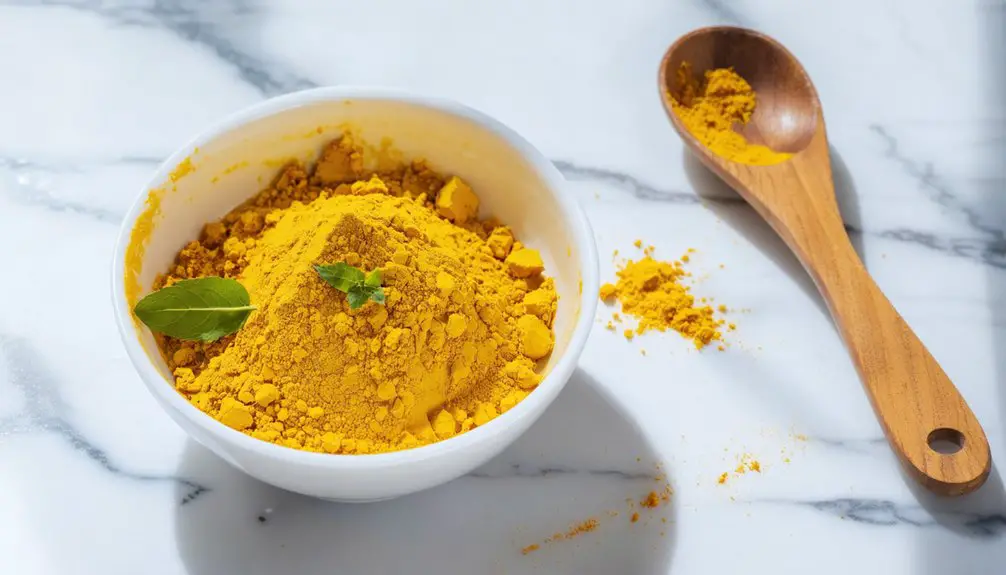
Several essential lifestyle modifications can significantly minimize tooth discoloration and preserve your smile’s natural appearance.
Through consistent oral health habits and tooth sensitivity management, you’ll protect your enamel while maintaining ideal dental health.
- Cut back on staining beverages like coffee, tea, and red wine – when you do consume them, use a straw to minimize contact with teeth surfaces.
- Adopt immediate rinsing or brushing after consuming staining substances to prevent pigment absorption.
- Eliminate tobacco use completely, as it’s a primary source of stubborn stains and compromises overall oral health.
- Reduce acidic beverage consumption and manage teeth grinding to protect your enamel integrity, particularly if you’re genetically predisposed to tooth sensitivity.
Managing the Emotional Impact of Tooth Discoloration
Living with tooth discoloration can profoundly impact your psychological well-being, affecting everything from social interactions to self-confidence. Research shows that seeking emotional support through family networks and dental professionals can greatly reduce anxiety and depression associated with discoloration.
You’ll benefit from addressing both the physical and emotional aspects of tooth discoloration. Consider joining support groups or consulting mental health professionals who understand the psychological impact of dental aesthetics.
Parents should be particularly attentive to children’s self-esteem concerns, as early intervention can prevent long-term emotional consequences.
Remember that your perception of discoloration may affect you more than its clinical severity. Focus on developing coping strategies and maintaining social connections while pursuing treatment options.
Working with healthcare providers who recognize the psychosocial dimensions of dental aesthetics can help you navigate these challenges effectively.
Frequently Asked Questions
Can Genetic Tooth Discoloration Skip Generations in Families?
Like pieces on a chessboard, your family genetics can make tooth discoloration skip generations, especially with recessive hereditary traits or X-linked conditions that pass through specific inheritance patterns.
How Early in Childhood Can Genetic Tooth Discoloration Be Detected?
You’ll notice early signs of genetic tooth discoloration when your child’s first teeth emerge around 6 months old. Childhood awareness through regular dental checkups helps detect these inherited conditions promptly.
Do Teeth Whitening Strips Work Differently on Genetically Discolored Teeth?
You’ll find teeth whitening strips are less effective on genetically discolored teeth since they can’t penetrate deeply enough to treat intrinsic stains, unlike their success with surface-level extrinsic stains.
Are Certain Ethnic Groups More Prone to Genetic Tooth Discoloration?
You’ll find ethnic variations in natural tooth color, but genetic discoloration isn’t strictly tied to ethnicity. Cultural perceptions and socioeconomic factors often influence how tooth color differences are reported and treated.
Can Pregnancy Affect the Severity of Genetic Tooth Discoloration?
In a million ways, pregnancy hormones can intensify your genetic tooth discoloration. You’ll experience heightened sensitivity, increased staining potential, and compromised dental health due to hormonal fluctuations affecting enamel and gum tissue.
References
- https://my.clevelandclinic.org/health/diseases/dentinogenesis-imperfecta
- https://www.gatewayfamilydentist.com/can-genetics-cause-tooth-discoloration
- https://www.beverlyfarmsdental.com/blog/2022/06/15/can-genetics-cause-stained-teeth/
- https://medlineplus.gov/genetics/condition/dentinogenesis-imperfecta/
- https://www.primarydental.com/dental-care/rare-tooth-disorders-you-should-know-about/
- https://www.goodrx.com/conditions/dental-care/foods-that-stain-your-teeth
- https://www.olberdingdental.com/blog/2024/10/what-causes-your-tooth-color-to-change-with-diet/
- https://www.bupa.co.uk/newsroom/ourviews/teeth-staining-foods
- https://www.northeastdentalarts.com/blog/foods-and-drinks-that-can-stain-your-teeth-and-what-to-do-about-it/
- https://familydentistottawa.com/7-foods-staining-teeth/
